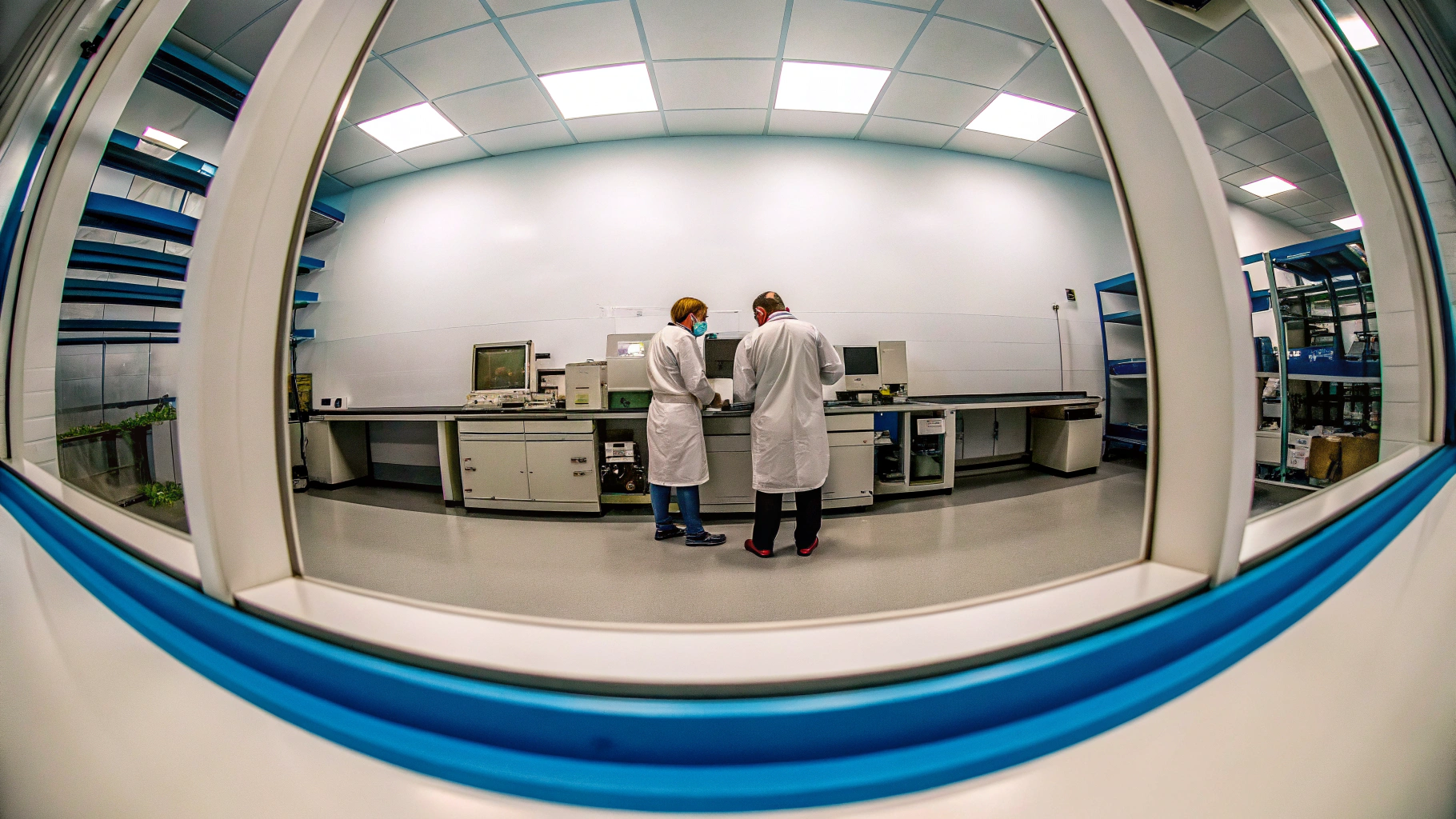10 Steps for Effective Operational Qualification in Pharma Compliance

Overview
The article primarily addresses the critical steps necessary for effective operational qualification in pharmaceutical compliance. It highlights the importance of a structured approach, which includes:
- Defining objectives
- Developing protocols
- Conducting tests
- Maintaining thorough documentation
This method is essential for ensuring regulatory adherence and upholding product quality in a highly regulated industry.
In the face of compliance challenges, organizations must adopt a systematic strategy. By clearly defining objectives, they set a solid foundation for their qualification processes. Developing detailed protocols ensures that every aspect of the operation is covered, minimizing the risk of oversight. Conducting rigorous tests further validates the processes in place, while comprehensive documentation serves as a safeguard, providing evidence of compliance and quality assurance.
Ultimately, these steps not only facilitate adherence to regulations but also enhance the overall integrity of pharmaceutical products. Engaging with AVS Life Sciences can provide the necessary support and expertise to navigate these complexities effectively. Are you ready to elevate your compliance strategies?
By implementing these essential steps, organizations can confidently meet regulatory requirements and maintain high standards of product quality.
Introduction
In the pharmaceutical industry, compliance and quality are non-negotiable. Operational qualification stands as a critical pillar for ensuring that systems and equipment perform as intended. As organizations increasingly lean on digital and automated verification tools, the need for a robust operational qualification process has never been more pressing.
However, many companies grapple with the complexities of establishing effective protocols that not only meet regulatory standards but also enhance overall operational efficiency. How can organizations navigate these challenges and elevate their compliance strategies to thrive in an ever-evolving regulatory landscape?
To address these pressing issues, companies must adopt comprehensive compliance solutions that streamline operational qualification processes. By leveraging advanced technologies and proven methodologies, organizations can ensure adherence to regulatory requirements while optimizing their workflows.
Consider the success stories of companies that have implemented innovative compliance strategies. These case studies illustrate how effective operational qualification can lead to improved efficiency and reduced risk.
In conclusion, the path to enhanced compliance in the pharmaceutical sector is clear. Organizations must prioritize operational qualification as a foundational element of their compliance strategy, ensuring they not only meet but exceed regulatory expectations. By doing so, they position themselves for success in a competitive and ever-changing landscape.
AVS Life Sciences: Comprehensive Operational Qualification Services
AVS Life Sciences presents a comprehensive suite of operation qualification services designed specifically for the pharmaceutical sector. In an industry where regulatory adherence and quality assurance are paramount, the company ensures that all equipment and systems pass operation qualification to meet rigorous operational standards. This commitment is particularly vital as 66% of companies anticipate a greater reliance on digital and automated verification tools to enhance compliance and efficiency.
The multifaceted strategy of AVS Life Sciences encompasses:
- Validation and commissioning
- Quality assurance consulting
- Engineering support
This positions the company as a trusted partner for organizations navigating complex regulatory landscapes. Achieving successful operation qualification is not just a goal; it’s essential for maintaining compliance and ensuring product quality, especially as the pharmaceutical industry faces increasingly intricate regulatory demands.
Recent trends indicate that organizations implementing robust performance validation strategies experience significant improvements in regulatory adherence. Many report enhanced operational efficiency as a direct result. AVS Life Sciences has demonstrated its capabilities through successful projects, such as the enhancement of a biotechnology GMP facility. This initiative not only met regulatory standards but also significantly improved the client’s manufacturing capabilities. Such dedication to excellence in functional qualification highlights the importance of operation qualification and comprehensive validation methods in achieving sustained compliance and product integrity.
In conclusion, the landscape of pharmaceutical compliance is evolving, and organizations must adapt to these changes. By partnering with AVS Life Sciences, companies can navigate these complexities with confidence, ensuring they not only meet but exceed regulatory expectations. Are you ready to elevate your compliance strategy?

Define Operational Qualification: Key Principles and Objectives
Operation qualification is a crucial phase in the validation process, confirming that equipment and systems operate within specified limits and perform as intended. The key principles of operation qualification include the thorough definition, documentation, and testing of all functional parameters. The primary objectives are to verify that the system operates correctly under normal conditions and to perform an operation qualification to establish a baseline for future performance assessments. This phase is essential for operation qualification, ensuring adherence to Good Manufacturing Practices (GMP) and playing a vital role in meeting regulatory standards, including GXP and FDA regulations.
Statistics reveal that successful operation qualification execution significantly mitigates the risk of non-compliance. Many organizations report an impressive 80% success rate in meeting predefined acceptance criteria during operation qualification. Common objectives in OQ include:
- Verifying equipment functionality
- Ensuring error detection mechanisms operate as expected
- Confirming that all operational tests meet or exceed established benchmarks.
Moreover, the protocol for operation qualification should encompass objectives, scope, methodology, and acceptance criteria to ensure a structured approach. By adhering to these principles, organizations can enhance their regulatory stance and ensure the operation qualification of their manufacturing processes. This aligns seamlessly with AVS Life Sciences' commitment to delivering comprehensive quality management and regulatory solutions for the life sciences sector. Are you ready to elevate your compliance strategies and ensure operational excellence?

Identify Equipment and Systems Requiring Operational Qualification
To effectively navigate qualification processes, organizations must first pinpoint the equipment and systems that necessitate qualification. This typically encompasses critical systems such as HVAC, water purification systems, and manufacturing equipment. A thorough risk assessment is vital for prioritizing these systems, enabling organizations to concentrate on high-impact areas that directly influence compliance and product quality. For example, HVAC systems are essential for maintaining controlled environments, while water purification systems safeguard the integrity of pharmaceutical products. By directing resources toward these critical components, organizations can boost operational efficiency and ensure that all necessary systems are qualified.
Statistics reveal that approximately 80% of pharmaceutical manufacturing facilities prioritize HVAC and water systems in their validation methods, underscoring the importance of these systems in maintaining high-quality standards. AVS Life Sciences exemplifies this commitment through its successful upgrade of a biotechnology GMP facility, where comprehensive quality management practices were implemented. This project not only adhered to regulatory compliance but also emphasized the significance of thorough documentation and traceability, as demonstrated in our collaboration with a leading biotechnology company.
Incorporating risk management from the outset of the IQ protocol design streamlines the validation process and safeguards product quality, ultimately enhancing confidence in the manufacturing system. As Andrea Salazar aptly notes, "Implementing IQ, OQ, and PQ protocols is more than just ensuring compliance; they have the potential to inspire confidence and trust in both the process and the product."
By focusing on these critical areas, organizations can not only meet compliance requirements but also foster a culture of quality and reliability.
Develop Operational Qualification Protocol: Essential Components
Developing a robust operation qualification protocol is essential for ensuring compliance and efficiency in regulated environments. A well-structured OQ protocol should encompass the following key components:
- Objective Statement: Clearly articulate the purpose of the OQ, outlining the specific goals the protocol aims to achieve.
- Equipment and System Descriptions: Provide comprehensive descriptions of the equipment and systems being qualified, including their specifications and intended use.
- Operational Parameters: Define the critical operational parameters that must be met during testing, ensuring alignment with user requirement specifications (URS).
- Testing Plan: Create a thorough testing plan that details the types of tests to be conducted, methodologies, and acceptance criteria. This plan should also include testing under various operating conditions, including worst-case scenarios, to rigorously assess equipment functionality and reliability. Such an approach is vital, as the operation qualification procedure evaluates equipment performance under normal operating conditions, reinforcing its significance in maintaining compliance.
- Personnel Duties: Clearly delineate the roles and responsibilities of all staff involved in the validation process to ensure accountability.
- Documentation Requirements: Specify the documentation necessary at each stage of the assessment, including test results, deviations, and corrective actions.
This organized approach not only facilitates adherence to regulatory standards but also prepares organizations for audits by ensuring that all elements of the certification process are thoroughly documented and verifiable.

Establish Acceptance Criteria for Operational Qualification
Setting acceptance standards is a critical phase in the operation qualification process. These criteria must align with manufacturer specifications, regulatory requirements, and industry best practices. Acceptance criteria can encompass parameters such as temperature ranges, pressure limits, and performance benchmarks. By establishing clear and measurable standards, organizations can objectively evaluate whether their equipment and systems meet functional requirements. This not only ensures adherence but also reinforces quality assurance.
Consider the implications of not having well-defined acceptance standards. Without them, organizations risk non-compliance, which can lead to costly setbacks and reputational damage. Therefore, it’s imperative to implement robust acceptance criteria that effectively guide the operation qualification process.
Incorporating industry best practices into your acceptance standards can significantly enhance compliance outcomes. For instance, organizations that have successfully adopted stringent acceptance criteria report improved operational efficiency and reduced risk of regulatory penalties. These case studies highlight the tangible benefits of a proactive approach to compliance.
Ultimately, establishing acceptance standards is not just about meeting requirements; it’s about fostering a culture of quality and accountability within your organization. Engage with AVS Life Sciences to explore tailored compliance solutions that can elevate your validation processes and ensure your systems consistently meet the highest standards.

Conduct Tests: Ensuring Compliance During Operational Qualification
Conducting tests during the operation qualification is a critical step that requires executing a well-defined testing plan and meticulously documenting the results. Tests must be performed under controlled conditions to ensure both accuracy and reliability. Common tests include:
- Checking temperature uniformity
- Pressure
- Flow rate
- Alarm functionality
These assessments gauge the system's capability to operate within defined limits, ensuring compliance with regulatory requirements and meeting user needs as part of the operation qualification.
The importance of thorough test documentation cannot be overstated. Precise records not only demonstrate adherence to established protocols but also provide crucial evidence during audits. Companies must present real data regarding product performance and oversight of procedures, underscoring the necessity of maintaining meticulous documentation practices. This aligns with the extensive checklist for Computer System Validation (CSV) in life sciences, ensuring adherence and quality assurance throughout the operation qualification process.
Involving qualified personnel in the testing procedure is paramount. Staff engaged in certification activities must be adequately trained and certified to ensure that all tests are performed according to established protocols, thereby upholding adherence and quality standards. This collaborative approach fosters responsibility and enhances the overall efficiency of the assessment, ultimately contributing to the production of high-quality pharmaceutical products. AVS Life Sciences emphasizes the value of professional assistance in managing these tasks, as illustrated in our transformative case study of enhancing a biotechnology GMP facility, which focused on quality assurance and regulatory compliance.
Document Results: Operational Qualification Reporting
Recording outcomes from the functional validation procedure is not just essential; it’s a cornerstone of proving adherence and maintaining traceability. Each test result must be documented in a standardized format, detailing test conditions, observations, and any deviations encountered. A comprehensive report should encapsulate the findings, clearly indicating whether acceptance criteria were met. This meticulous documentation serves as a crucial reference during regulatory audits and reinforces the organization’s commitment to quality and compliance.
Statistics reveal that comprehensive procedural validation documentation significantly lowers audit findings. Organizations that adhere to best practices in documentation have noted a remarkable 30% reduction in non-compliance issues. This underscores the importance of effective reporting practices in the pharmaceutical industry, which emphasize clarity and precision, ensuring that all stakeholders can easily interpret the results.
By prioritizing thorough documentation, companies can enhance their preparedness for regulatory examinations and foster a culture of accountability and excellence in operations. This dedication to quality management and regulatory adherence is vital for sustaining trust and excellence in the pharmaceutical and biotech sectors.
The functional validation testing stage, known as operation qualification (OQ), is part of the broader multi-step Computer System Validation (CSV) procedure. This procedure encompasses planning, defining user needs, design specifications, and installation validation, among others. Each stage plays a critical role in ensuring that the system operates as intended in the user environment.
In conclusion, embracing rigorous documentation practices not only mitigates compliance risks but also positions organizations as leaders in quality assurance. Are you ready to elevate your compliance strategies and ensure your organization stands out in the industry?

Implement Best Practices for Successful Operational Qualification
Applying optimal methods in operation qualification is essential for enhancing adherence results in the pharmaceutical sector. A critical aspect of this process is the comprehensive training of staff involved in certification activities. Effective training programs not only equip staff with the necessary skills but also cultivate a culture of compliance and quality assurance. Organizations that invest in extensive training for operational certification staff often report significantly higher success rates in operation qualification processes.
Key practices include:
- Maintaining clear communication among team members, which is vital for ensuring alignment on objectives and protocols.
- Employing a risk-based strategy to prioritize operation qualification efforts, allowing teams to focus on crucial areas that directly impact product quality and patient safety.
- Regularly reviewing and updating protocols in response to regulatory changes and industry advancements, which is essential for maintaining compliance.
Successful training programs for personnel frequently incorporate:
- Practical workshops
- E-learning modules
- Real-time simulations that replicate actual working situations
These initiatives not only enhance technical skills but also deepen understanding of regulatory requirements, leading to more effective assessment results.
By adopting these best practices, organizations can optimize their validation procedures, ensuring ongoing compliance and ultimately contributing to the safety and efficacy of pharmaceutical products. Are you ready to elevate your compliance strategies and ensure your organization thrives in this critical area?

Differentiate Operational Qualification from Other Validation Phases
Operation qualification (OQ) is frequently misunderstood, often being conflated with other validation phases such as installation qualification (IQ) and performance qualification (PQ). While IQ ensures that equipment is installed correctly and PQ evaluates the system's performance under real operating conditions, operation qualification (OQ) specifically focuses on the operational capabilities of the system within defined parameters. This distinction is vital for organizations striving to implement a thorough validation strategy that not only satisfies regulatory requirements but also guarantees product quality.
At AVS Life Sciences, we underscore the significance of adhering to GXP standards and FDA regulations throughout the operation qualification (OQ) process. Our commitment ensures that clients maintain robust documentation practices and effective standard operating procedures (SOPs). By understanding these distinctions and integrating expert solutions in GMP compliance and validation, organizations can navigate the complexities of the pharmaceutical and biotechnology industries successfully.
Consider the impact of a well-executed operation qualification process: it not only enhances compliance but also fosters trust in product quality. Are you ready to elevate your compliance strategy? Engage with AVS Life Sciences today to explore tailored solutions that meet your operational needs.
Address Challenges in Operational Qualification: Solutions and Strategies
Operation qualification poses significant challenges, including resource constraints, lack of expertise, and evolving regulatory requirements. These hurdles can be daunting, but AVS Life Sciences' recent success in upgrading a biotechnology GMP facility showcases effective strategies to overcome them.
During the transition from a Biosafety Level 1 GMP facility to a Level 2 GMP facility, we faced specific challenges, such as technician oversights with barcode scanner installations that initially resulted in unreliable test results. By implementing a robust risk management strategy, organizations can prioritize their assessment efforts based on impact. This approach was exemplified in our collaboration with a prominent San Francisco biotechnology firm, where our documentation efforts were recognized for demonstrating full traceability—an essential factor for maintaining regulatory compliance.
This project ultimately empowered the client to manufacture medication with lentivirus vector material, enabling them to concentrate on developing innovative medicines that enhance patient quality of life. Involving seasoned advisors like AVS Life Sciences can provide invaluable perspectives and assistance throughout the validation process.
Moreover, fostering a culture of continuous improvement and staying attuned to regulatory changes can help organizations effectively adapt their operation qualification strategies. By regularly reviewing and refining their approaches, compliance officers can elevate their operational excellence and ensure adherence to industry standards. This commitment not only enhances compliance but also significantly improves the quality of life for patients.

Conclusion
In the complex realm of pharmaceutical compliance, operational qualification emerges as a vital process that guarantees equipment and systems operate as intended, all while meeting rigorous regulatory standards. The significance of operational qualification is immense; it is crucial for upholding product quality and regulatory compliance in an industry where precision and reliability are non-negotiable.
This article explores the comprehensive approach necessary for effective operational qualification, emphasizing key steps such as:
- Identifying critical equipment
- Developing structured protocols
- Establishing clear acceptance criteria
- Conducting thorough testing
Each of these elements is essential in bolstering compliance and operational excellence. By adopting best practices and nurturing a culture of continuous improvement, organizations can greatly enhance their validation processes and reduce the risks tied to non-compliance.
Ultimately, adopting a robust operational qualification strategy not only ensures regulatory adherence but also positions organizations as frontrunners in quality assurance within the pharmaceutical sector. Collaborating with expert partners like AVS Life Sciences can offer invaluable assistance in navigating these complexities, ensuring that companies not only meet but surpass regulatory expectations. The call to action is unmistakable: elevate your compliance strategies today to secure a future of excellence in pharmaceutical manufacturing.
Frequently Asked Questions
What services does AVS Life Sciences offer for operational qualification?
AVS Life Sciences provides a comprehensive suite of operational qualification services tailored for the pharmaceutical sector, including validation and commissioning, quality assurance consulting, and engineering support.
Why is operational qualification important in the pharmaceutical industry?
Operational qualification is essential for ensuring that equipment and systems operate correctly within specified limits, maintaining compliance with Good Manufacturing Practices (GMP), and meeting regulatory standards such as GXP and FDA regulations.
What are the key principles of operational qualification?
The key principles include thorough definition, documentation, and testing of all functional parameters, verifying system functionality under normal conditions, and establishing a baseline for future performance assessments.
What objectives are typically included in operational qualification?
Common objectives in operational qualification include verifying equipment functionality, ensuring error detection mechanisms work as expected, and confirming that all operational tests meet or exceed established benchmarks.
How can organizations identify equipment and systems that require operational qualification?
Organizations should conduct a thorough risk assessment to identify critical systems that necessitate qualification, such as HVAC, water purification systems, and manufacturing equipment, focusing on high-impact areas that influence compliance and product quality.
What is the success rate of organizations meeting acceptance criteria during operational qualification?
Many organizations report an impressive 80% success rate in meeting predefined acceptance criteria during operational qualification.
How does AVS Life Sciences demonstrate its capabilities in operational qualification?
AVS Life Sciences has successfully completed projects, such as enhancing a biotechnology GMP facility, which not only met regulatory standards but also improved the client's manufacturing capabilities through comprehensive quality management practices.
Why is risk management important in the operational qualification process?
Incorporating risk management from the outset of the Installation Qualification (IQ) protocol design streamlines the validation process, safeguards product quality, and enhances confidence in the manufacturing system.
What trends are observed in the pharmaceutical sector regarding operational qualification?
Recent trends indicate that organizations implementing robust performance validation strategies experience significant improvements in regulatory adherence and operational efficiency.
